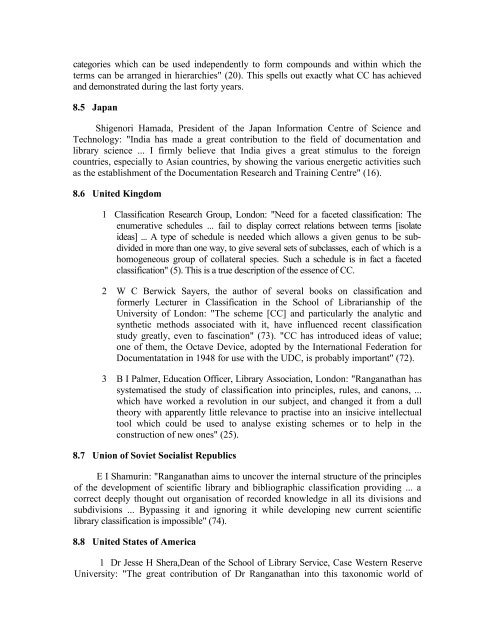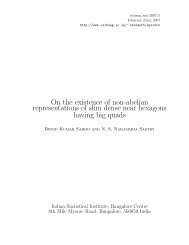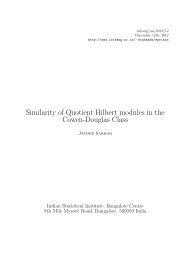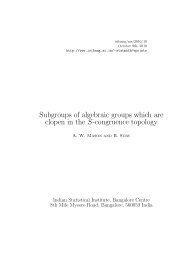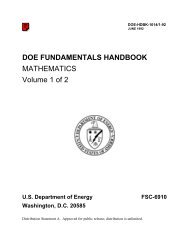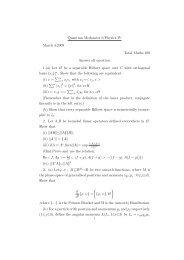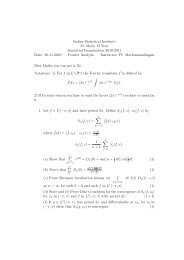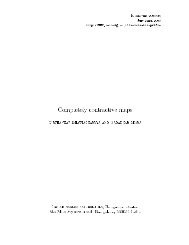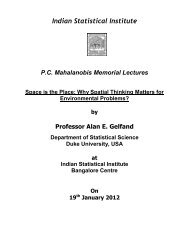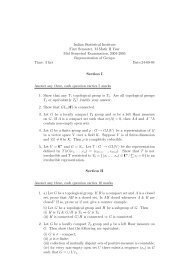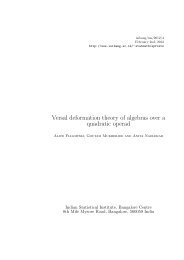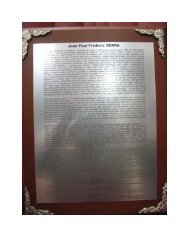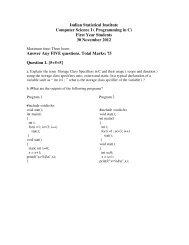CHOICE OF SCHEME FOR CLASSIFICATION - Indian Statistical ...
CHOICE OF SCHEME FOR CLASSIFICATION - Indian Statistical ...
CHOICE OF SCHEME FOR CLASSIFICATION - Indian Statistical ...
Create successful ePaper yourself
Turn your PDF publications into a flip-book with our unique Google optimized e-Paper software.
categories which can be used independently to form compounds and within which the<br />
terms can be arranged in hierarchies" (20). This spells out exactly what CC has achieved<br />
and demonstrated during the last forty years.<br />
8.5 Japan<br />
Shigenori Hamada, President of the Japan Information Centre of Science and<br />
Technology: "India has made a great contribution to the field of documentation and<br />
library science ... I firmly believe that India gives a great stimulus to the foreign<br />
countries, especially to Asian countries, by showing the various energetic activities such<br />
as the establishment of the Documentation Research and Training Centre" (16).<br />
8.6 United Kingdom<br />
1 Classification Research Group, London: "Need for a faceted classification: The<br />
enumerative schedules ... fail to display correct relations between terms [isolate<br />
ideas] ... A type of schedule is needed which allows a given genus to be subdivided<br />
in more than one way, to give several sets of subclasses, each of which is a<br />
homogeneous group of collateral species. Such a schedule is in fact a faceted<br />
classification" (5). This is a true description of the essence of CC.<br />
2 W C Berwick Sayers, the author of several books on classification and<br />
formerly Lecturer in Classification in the School of Librarianship of the<br />
University of London: "The scheme [CC] and particularly the analytic and<br />
synthetic methods associated with it, have influenced recent classification<br />
study greatly, even to fascination" (73). "CC has introduced ideas of value;<br />
one of them, the Octave Device, adopted by the International Federation for<br />
Documentatation in 1948 for use with the UDC, is probably important" (72).<br />
3 B I Palmer, Education Officer, Library Association, London: "Ranganathan has<br />
systematised the study of classification into principles, rules, and canons, ...<br />
which have worked a revolution in our subject, and changed it from a dull<br />
theory with apparently little relevance to practise into an insicive intellectual<br />
tool which could be used to analyse existing schemes or to help in the<br />
construction of new ones" (25).<br />
8.7 Union of Soviet Socialist Republics<br />
E I Shamurin: "Ranganathan aims to uncover the internal structure of the principles<br />
of the development of scientific library and bibliographic classification providing ... a<br />
correct deeply thought out organisation of recorded knowledge in all its divisions and<br />
subdivisions ... Bypassing it and ignoring it while developing new current scientific<br />
library classification is impossible" (74).<br />
8.8 United States of America<br />
1 Dr Jesse H Shera,Dean of the School of Library Service, Case Western Reserve<br />
University: "The great contribution of Dr Ranganathan into this taxonomic world of


